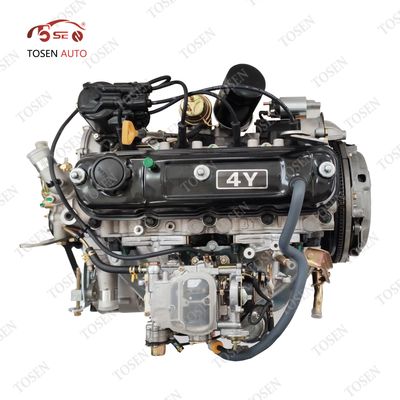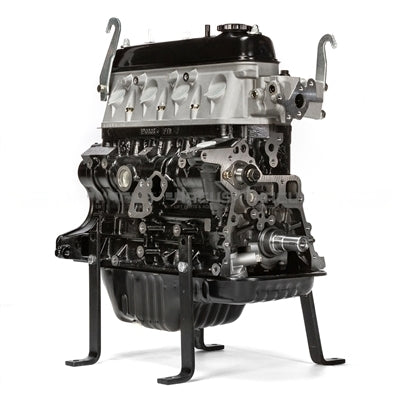Exploring the Benefits of the 4Y Engine for Automotive Enthusiasts
Exploring the Benefits of the 4Y Engine for Automotive Enthusiasts
Blog Article
The Ultimate Guide to the Engine: Trick Insights for every single Car Enthusiast
Comprehending the engine is essential for any type of automobile lover, as it functions as the heart of the vehicle and dictates its performance. This guide offers a thorough examination of engine composition, kinds, and the auto mechanics behind their operation, consisting of the ingenious modern technologies that are improving the vehicle landscape. Moreover, it emphasizes the important nature of maintenance methods that can substantially affect an engine's life-span. The intricacies of engine characteristics and the latest innovations in technology present inquiries that warrant further expedition. What might these insights expose concerning the future of auto design?
Makeup of an Engine
Recognizing the makeup of an engine is critical for any auto lover looking to dig deeper right into automobile mechanics. An interior combustion engine largely is composed of several essential elements that work in unison to transform fuel right into mechanical power.
At the heart of this system lies the cyndrical tube block, which houses the cylinders where combustion happens. Piston activity within these cyndrical tubes is helped with by the crankshaft, which translates linear activity right into rotational power. In addition, the camshaft plays a vital duty in managing the opening and closing of the engine's shutoffs, guaranteeing correct air-fuel combination intake and exhaust gas expulsion.
Various other necessary parts include the gas system, which provides the engine with the needed fuel, and the ignition system, in charge of launching combustion - 4y engine. The air conditioning and lubrication systems are additionally indispensable, keeping optimal operating temperatures and reducing friction, specifically
Engine Types and Configurations
A varied variety of engine kinds and configurations exists, each offering distinct benefits and disadvantages tailored to different driving needs and choices. The most usual engine types consist of inline, V, level, and rotating setups.
Inline engines, featuring cylinders prepared in a single line, are known for their simpleness and efficiency. They are typically discovered in compact cars, offering a balance of power and economy. V engines, defined by their two financial institutions of cylinders prepared in a V form, offer greater efficiency and smoother procedure, making them popular in sports and high-end cars.
Level engines, or boxer engines, have horizontally opposed cyndrical tubes, which contribute to a lower facility of gravity, boosting car stability. These are typically seen in brands like Subaru and Porsche.
Rotary engines, although much less common, use an unique style with a triangular rotor and offer high power-to-weight proportions. They master light-weight and compact applications, primarily seen in Mazda cars.
Each engine kind offers particular efficiency attributes, weight distributions, and fuel performances, ensuring that vehicle lovers can choose the right engine configuration to match their driving design and vehicle needs.

How Engines Function
Engines, no matter of their type or configuration, operate essential principles that regulate their efficiency and performance. At their core, engines transform gas right into mechanical power with a collection of regulated explosions or compressions. This process typically includes four main strokes: consumption, exhaust, compression, and power.
During the consumption stroke, the engine attracts a blend of air and fuel. The compression stroke follows, where the mixture is compressed in the cylinder, increasing its temperature level and pressure. In the power stroke, a trigger ignites the compressed combination (in gas engines) or the blend fires up spontaneously (in diesel engines), causing a quick expansion of gases that pushes the piston down. Lastly, the exhaust stroke eliminates the spent gases from the cyndrical tube.
The performance of an engine is influenced by numerous variables, including the layout of the burning chamber, the type of gas made use of, and the accuracy of the engine's elements. Understanding these fundamental principles is vital for cars and truck lovers who seek to appreciate the elaborate technicians behind their automobiles, along with for those aiming to boost performance through alterations and tuning.
Advancements in Engine Modern Technology
In the last few years, improvements in engine technology have significantly changed the auto landscape, enhancing both performance and ecological sustainability. One of one of the most noteworthy innovations is the growth of turbocharging and supercharging, which enables smaller sized engines to produce greater power results without sacrificing fuel effectiveness. This has actually led to an increase in the popularity of downsized engines, providing producers with the capability to satisfy stringent discharges regulations while keeping efficiency criteria.
Furthermore, crossbreed and electric powertrains are reshaping the engine standard. Hybrid systems combine interior combustion engines with electrical motors, enhancing fuel consumption and lowering exhausts. Totally electric vehicles (EVs) get rid of the burning engine altogether, relying upon sophisticated battery innovation to supply immediate torque and excellent velocity.
Additionally, the integration of fabricated knowledge and device learning in engine administration systems permits real-time optimization of efficiency specifications, improving efficiency and responsiveness. Advancements such as variable valve timing and straight gas injection further improve combustion processes, optimizing power result while decreasing additional hints waste.
As the automobile market proceeds to evolve, these innovations in engine modern technology will play an important function in forming the future of mobility, prioritizing both efficiency and sustainability.
Upkeep Tips for Fanatics
Maintaining an engine is as crucial as the developments that enhance its performance. Routine upkeep not from this source only extends the life of your engine but also guarantees optimal performance.
Replace and inspect air filters periodically to guarantee proper air flow, which is vital for combustion effectiveness. A stopped up air filter can cause decreased performance and enhanced gas intake. Likewise, keep an eye on the coolant degrees to stop getting too hot, and replace coolant according to the service routine.

Final Thought
Finally, a detailed understanding of engine anatomy, types, and mechanics is essential for auto fanatics. The expedition of technologies such as turbocharging and crossbreed systems highlights the developments in efficiency and performance. Furthermore, normal upkeep practices, consisting of oil changes and air filter checks, are critical for ensuring ideal engine functionality and long life. Proficiency of these ideas cultivates a deeper admiration for engine characteristics and boosts the total driving experience.

Engines, regardless of their kind or setup, operate on basic click here to find out more principles that govern their performance and performance. In the power stroke, a trigger ignites the pressed mix (in gas engines) or the combination stirs up spontaneously (in diesel engines), resulting in a fast expansion of gases that presses the piston down.In current years, developments in engine modern technology have actually substantially changed the automotive landscape, enhancing both efficiency and ecological sustainability.
Report this page